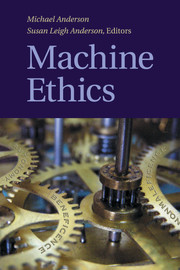Book contents
- Frontmatter
- Contents
- General Introduction
- PART I THE NATURE OF MACHINE ETHICS
- PART II THE IMPORTANCE OF MACHINE ETHICS
- PART III ISSUES CONCERNING MACHINE ETHICS
- PART IV APPROACHES TO MACHINE ETHICS
- PART V VISIONS FOR MACHINE ETHICS
- Introduction
- 28 What Can AI Do for Ethics?
- 29 Ethics for Self-Improving Machines
- 30 How Machines Might Help Us Achieve Breakthroughs in Ethical Theory and Inspire Us to Behave Better
30 - How Machines Might Help Us Achieve Breakthroughs in Ethical Theory and Inspire Us to Behave Better
from PART V - VISIONS FOR MACHINE ETHICS
Published online by Cambridge University Press: 01 June 2011
- Frontmatter
- Contents
- General Introduction
- PART I THE NATURE OF MACHINE ETHICS
- PART II THE IMPORTANCE OF MACHINE ETHICS
- PART III ISSUES CONCERNING MACHINE ETHICS
- PART IV APPROACHES TO MACHINE ETHICS
- PART V VISIONS FOR MACHINE ETHICS
- Introduction
- 28 What Can AI Do for Ethics?
- 29 Ethics for Self-Improving Machines
- 30 How Machines Might Help Us Achieve Breakthroughs in Ethical Theory and Inspire Us to Behave Better
Summary
Ai researchers are primarily interested in machine ethics to calm the fears of the general public, who worry that the development of intelligent autonomous machines might lead to humans being mistreated. Those with foresight see this work as essential to the public's permitting AI research to go forward. This is certainly an important goal of machine ethics research; but there is, I believe, the potential for achieving an even more important goal. Today, the world is being torn apart by people with conflicting ethical beliefs battling one another. Even ethicists put forth different theories to determine what constitutes ethical behavior. Unless we come to agreement on how we should behave toward one another, there is no hope of ending the bloodshed and injustices we hear about in the news every day. I believe that machine ethics research has the potential to achieve breakthroughs in ethical theory that will lead to universally accepted ethical principles, and that interacting with “ethical” machines might inspire us to behave more ethically ourselves.
Humans' unethical behavior can often be traced to five tendencies in our behavior: (1) We are prone to getting carried away by emotion, which can lead to our behaving irrationally. (2) We tend to think only about our own desires and goals, that is, we tend to behave egoistically. (3) We tend to adopt, unreflectively, the values of those around us. (4) We don't have good role models. When we see our heroes behaving unethically, it gives us an excuse for not trying to be more ethical ourselves.
- Type
- Chapter
- Information
- Machine Ethics , pp. 524 - 530Publisher: Cambridge University PressPrint publication year: 2011
- 8
- Cited by



